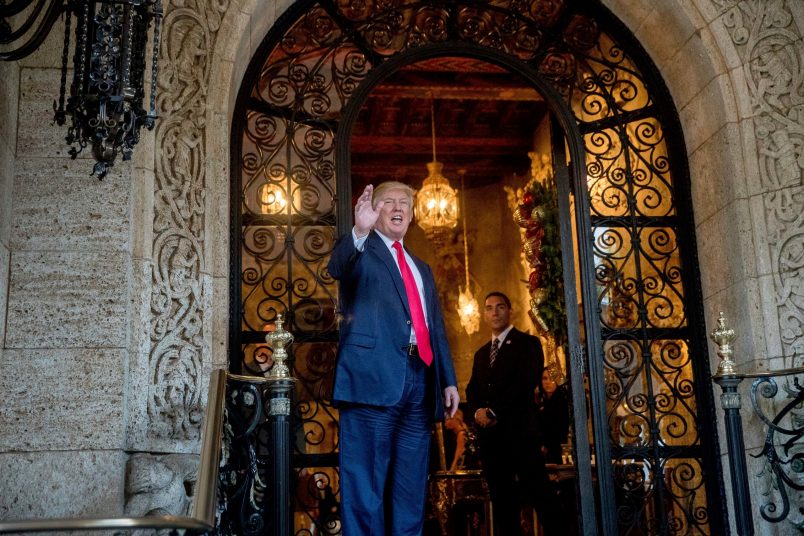Mar-a-Lago has recently been revealed as a hub for influence peddlers and potential spies, leading to accusations from top Democrats and pundits that Trump’s winter White House doubles as a sieve for classified information.
But what precisely makes it such a disaster for officials looking guard the nation’s secrets?
Presidents regularly take selfies with random fans, exposing them to possible reputational risk. And it’s not new for the Secret Service to confront espionage issues — agents are expected to provide more than just physical security for the president.
Former Secret Service and counterintelligence agents told TPM that Mar-a-Lago distinguishes itself in how it combines traditional weak points — a set pattern of repeat visits, public access — with an incautious boss and a profit motive that appears to override all else. Mar-a-Lago is an active club with regularly scheduled events, increasing the amount of people passing through a place that also doubles as a presidential residence.
“It’s still an operating business that has people who are not affiliated or associated with the President or government having access to the location,” said Jeffrey Ringel, a 21-year FBI veteran who works as a director at Soufan Group, a security intelligence firm. “It makes it an easy target. It gives people more time to plan out if they want to do some sort of eavesdropping mission.”
Loose lips sink ships
Allegations that Mar-a-Lago is a massive intelligence risk have been percolating since Trump took office.
Former CIA agent Cindy Otis told TPM that Mar-a-Lago combines different risks that could be mitigated on their own but, when kept together, morph into one bigger problem.
“Mar-a-Lago is a destination for not just the President but people who are close to the President,” Otis said. “He holds a lot of conversations there, he talks openly about different policy issues there, so it’s a prime target for intelligence services.”
The president famously afforded Mar-a-Lago club members a front-row seat to his response to a February 2017 missile scare involving North Korea.
But the past month’s scandal around Cindy Yang and the March 30 arrest of Yujing Zhang turbocharged both the concerns around Mar-a-Lago and, according to the Miami Herald, a pre-existing counterintelligence investigation into Chinese spying at the Winter White House.
Congressional Democrats have called for investigations into the issue, while the Government Accountability Office recently completed its own probe of the Secret Service’s role at Mar-a-Lago.
Public-private partnership
The Secret Service, an organization whose primary mission is physical protection of the president and family, finds itself in a new position at Mar-a-Lago. There, it has to cope not only with the demands of White House staff, but with commercial decisions by club management.
The Secret Service hinted at this issue in an April 2 statement issued following initial reports of Zhang’s arrest.
“The Secret Service does not determine who is invited or welcome at Mar-a-Lago; this is the responsibility of the host entity,” the Secret Service said. “The Mar-a-Lago club management determines which members and guests are granted access to the property.”
Yang’s business of charging random wealthy Chinese for access reveals how essentially anyone with cash can gain access, with Zhang’s bizarre arrest providing a concrete example.
Part of the issue, experts said, is that the Palm Beach club isn’t a one-off destination like a fundraising dinner or campaign stop — it’s a secondary residence for the president, meaning that the Secret Service must have a permanent presence at the club, former FBI agent Larry Johnson told TPM.
“They have to work with the White House staff so they can run their business,” he said. “You have to give up something to get something.”
Douglas Smith, a former assistant secretary of homeland security, described the problem to TPM as one of being a “set pattern.”
“Mar-a-Lago is in many ways a public compound, there are hundreds of people, it’s a pay-to-play kind of thing there,” he said. “As far as the Secret Service goes, they’re not vetting the membership. If Trump Org cashes the check, that’s that.”
The extent of the problem arguably remains behind closed doors. We know about Cindy Yang’s access-peddling thanks to Patriots owner Robert Kraft’s alleged solicitation of prostitution at a spa Yang owned. Former Secret Service director Ralph Basham pointed out that the reason we know about Zhang is because she was apprehended.
“It’s a very difficult position that the Secret Service finds itself in,” Basham said. “You have a public place, and they really don’t have total control over the security.”
“But in this case, the process worked,” he added.










